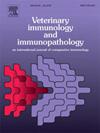TRIM21与i -κB α相互作用,负调控假结核棒状杆菌感染巨噬细胞中NF-κB的活化
IF 1.4
3区 农林科学
Q4 IMMUNOLOGY
引用次数: 0
摘要
假结核棒状杆菌是一种人畜共患的细胞内细菌,可导致感染宿主的脓肿和脓肉芽肿形成,这本质上是一种慢性炎症反应。TRIM21 (Tripartite motif-containing protein 21)负调控假结核杆菌感染过程中促炎细胞因子的产生,其机制尚不清楚。本研究发现巨噬细胞感染假结核杆菌可诱导i - κ b和p65磷酸化。TRIM21通过PRY/SPRY结构域与i - κ b α相互作用,稳定i - κ b α,负调控假结核杆菌感染巨噬细胞中i - κ b α磷酸化。此外,TRIM21在假结核杆菌感染的巨噬细胞中通过K48连锁而不是K63连锁正向调节i - κ b α的泛素化。总之,我们的研究证实,TRIM21通过与i -κB α相互作用并降低i -κB α在假结核杆菌感染巨噬细胞中的磷酸化,从而负向调节NF-κB活化。通过调节NF-κB通路预防假结核杆菌感染引起的炎症是控制该病原体的潜在途径。本文章由计算机程序翻译,如有差异,请以英文原文为准。
TRIM21 interacts with IκBα and negatively regulates NF-κB activation in Corynebacterium pseudotuberculosis-infected macrophages
Corynebacterium pseudotuberculosis, a zoonotic intracellular bacteria, is responsible for abscesses and pyogranuloma formation of the infected host, which is essentially a chronic inflammatory response. Tripartite motif-containing protein 21 (TRIM21) negatively regulates pro-inflammatory cytokines production during C. pseudotuberculosis infection, the mechanism of which remains unclear. This study found that C. pseudotuberculosis infection in macrophages induced phosphorylation of IκB and p65. TRIM21 interacted with IκBα by PRY/SPRY domain, stabilizes IκBα and negatively regulates IκBα phosphorylation in macrophages during C. pseudotuberculosis infection. In addition, TRIM21 positively regulates the ubiquitination of IκBα via K48 linkage rather than K63 linkage in C. pseudotuberculosis-infected macrophages. In brief, our research confirmed that TRIM21 negatively regulates canonical NF-κB activation by interacting with IκBα and decreasing IκBα phosphorylation in macrophages during C. pseudotuberculosis infection. Preventing inflammation induced by C. pseudotuberculosis infection through regulation of the NF-κB pathway is a potential way to control this pathogen.
求助全文
通过发布文献求助,成功后即可免费获取论文全文。
去求助
来源期刊
CiteScore
3.40
自引率
5.60%
发文量
79
审稿时长
70 days
期刊介绍:
The journal reports basic, comparative and clinical immunology as they pertain to the animal species designated here: livestock, poultry, and fish species that are major food animals and companion animals such as cats, dogs, horses and camels, and wildlife species that act as reservoirs for food, companion or human infectious diseases, or as models for human disease.
Rodent models of infectious diseases that are of importance in the animal species indicated above,when the disease requires a level of containment that is not readily available for larger animal experimentation (ABSL3), will be considered. Papers on rabbits, lizards, guinea pigs, badgers, armadillos, elephants, antelope, and buffalo will be reviewed if the research advances our fundamental understanding of immunology, or if they act as a reservoir of infectious disease for the primary animal species designated above, or for humans. Manuscripts employing other species will be reviewed if justified as fitting into the categories above.
The following topics are appropriate: biology of cells and mechanisms of the immune system, immunochemistry, immunodeficiencies, immunodiagnosis, immunogenetics, immunopathology, immunology of infectious disease and tumors, immunoprophylaxis including vaccine development and delivery, immunological aspects of pregnancy including passive immunity, autoimmuity, neuroimmunology, and transplanatation immunology. Manuscripts that describe new genes and development of tools such as monoclonal antibodies are also of interest when part of a larger biological study. Studies employing extracts or constituents (plant extracts, feed additives or microbiome) must be sufficiently defined to be reproduced in other laboratories and also provide evidence for possible mechanisms and not simply show an effect on the immune system.

 求助内容:
求助内容: 应助结果提醒方式:
应助结果提醒方式:


